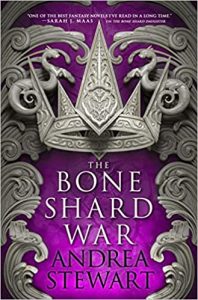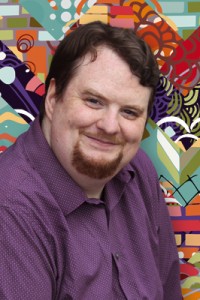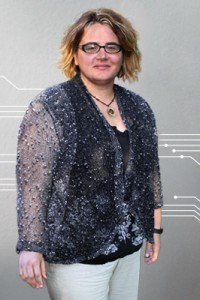Andrea Stewart: After the Rebellion
Andrea G. Stewart was born August 3, 1982 in Vancouver, Canada, and grew up in various places in the US.
Stewart began publishing work of genre interest with “Dreameater” (2013), a quarterly winner in the Writers of the Future competition. She has published more than a dozen other stories in anthologies and magazines.
Her first novel, urban fantasy Loose Changeling, appeared in 2014 under the name A.G. Stewart, and was followed by sequel Spare Changeling in 2018. Epic fantasy novel The Bone Shard Daughter (2020) was a finalist for the Compton Crook and British Fantasy Awards, and launched the Drowning Empire series, which also includes The Bone Shard Emperor (2021) and The Bone Shard War (2023). The Gods Below, out in 2024, will launch a new fantasy trilogy.
Stewart lives in the San Francisco Bay Area with her husband and children.
Excerpt from the interview:
“I enjoy both science fiction and fantasy a lot. Lately I’ve been writing a lot of fantasy – I don’t want to divert from that because of reader expectations and everything, but I enjoy taking science fiction concepts and putting them into fantasy. That brings something a little fresh and new to the books. Fantasy should also be a place where we can explore those science-fictional questions. I’m doing something similar in my next series, where I’m trying to examine what happens when you have this world-altering technological change, and how that actually affects everybody. Sometimes we see fantasy as all medieval Europe, and I’m glad the field is branching away from that. This next book is my way of doing the same thing, in a slightly different direction.
“Both of my parents were immigrants, so there’s that expectation of ‘We came from this other country and we got all these opportunities for you – you’re going to take advantage of it.’ They very much emphasized, ‘You have to get an A in math and you have to get an A in science – it’s okay if you get a B in English.’ Right? Priorities. When I said, ‘I want to go into the arts,’ they weren’t exactly okay with it. Back then, I really struggled with the situation, and I had a lot of conflict with my mom especially over what I should study in college. Now, being older, I understand more where she was coming from. I know it came from a good place. There’s this cultural divide that is hard to get past, because, for her, it’s a matter of wanting your kids to succeed – you want to see them do well, and you want them to make a living and be independent. But in America, the culture is constantly giving you the message, ‘Follow your dreams, and everything else will work out.’ It was a culture clash, in a lot of ways, where I was absorbing this American culture of ‘Follow your dreams,’ and my mom was coming from this culture of practicality: ‘That’s not going to pay your bills. I want to see you do well in life, and to be independent, and to not have to worry financially.’ That’s not something I understood until I got older.
“I did compromise. I went to a four-year college and got a degree in the most practical thing I could that was also easy enough that I could write on the side – which was economics. I wasn’t going to shame my parents, but I was not interested in being a doctor, lawyer, or an engineer. I wrote a book on the side while in college – which did not get me an agent, but it was a first step in the right direction, for me.
“I got a practical job where I could pay the bills, and my mom still hinted a lot about how I could maybe become a lawyer, if I wanted to. I said, ‘No, Mom. I don’t want to go back to school.’ Then I got that book deal… I think she’s very proud of me, now – of how hard I’ve worked and how far I’ve come. But we disagreed a lot when I was an adolescent, for sure.
“I had a lot of self-doubt as time went on and I hadn’t had a book published yet. I got this degree and this job just so I could have time to write, and if I didn’t make writing work, what had I been doing with my life? It was gratifying to finally break through, because I had invested so much in trying to get there. At the same time, I had to let go in some ways. If you feel like being a successful writer is the only thing that’s going to make your life matter, it’s very easy to fall into mental health issues. You’re putting too much of your well-being into the hands of the market – which you can’t control.
“I sold my book November of 2019, and we very quickly went into the pandemic after that. I had to adjust to the pandemic, and then adjust to the fact that writing was my job, now – it’s not something I do on the side. Then I had a deadline, and I was pregnant with my first kid…. It was a lot of big life changes at the same time. And we had two kittens! A lot of the things I thought I would be doing for my first book were things that I couldn’t do because we were on lockdown. All those plans went away, which was a little bit sad. I look back at that time, and it was just taking things one day at a time and trying not to worry too much about the future. Acknowledging that if I had to ask for an extension on my deadline, that was okay. Everyone was doing it at that point because of the pandemic.
“I’m hoping when The Gods Below hits the shelf that I can do some of the things had wanted to do when my first book came out. Some of it is ridiculous stuff, like: I want to have a book cake. For some reason, that was in my head as something that I was going to do when I finally had a book published – I wanted a cake with my book cover on it.
 “There are a couple things that are really important to me about The Bone Shard Daughter. One of them is: I set out with the intention of exploring the idea of what happens after. A common trope in fantasy is that you have rebellions – the heroes overthrow the government, and then they put somebody better in place, and that’s it. It’s over – everything is wonderful. First off, I love those books, but I always think, ‘Well, there’s no way it works like that.’ Changing from one way of governing to another is always going cause a lot of upheaval, and that’s going to be hard for whoever is coming in to take over. There’s a lot of damage that needs to be healed, and fixed, and is replacing one king or queen with another really the best solution? You’re still perpetuating this system of oppression, really. Even if the new ruler is good, is that the best way toward progress? Because at some point, that person is going to die, or they’re going to be assassinated. It feels like a very temporary solution.
“There are a couple things that are really important to me about The Bone Shard Daughter. One of them is: I set out with the intention of exploring the idea of what happens after. A common trope in fantasy is that you have rebellions – the heroes overthrow the government, and then they put somebody better in place, and that’s it. It’s over – everything is wonderful. First off, I love those books, but I always think, ‘Well, there’s no way it works like that.’ Changing from one way of governing to another is always going cause a lot of upheaval, and that’s going to be hard for whoever is coming in to take over. There’s a lot of damage that needs to be healed, and fixed, and is replacing one king or queen with another really the best solution? You’re still perpetuating this system of oppression, really. Even if the new ruler is good, is that the best way toward progress? Because at some point, that person is going to die, or they’re going to be assassinated. It feels like a very temporary solution.
“Another thing I wanted to look at was that idea of redemption, so I have characters in my book that do terrible things. Especially with online internet culture these days, if you do something bad, and most especially if you’re from a marginalized group, you’re basically kicked off the internet – which is not a bad thing, per se, but I do wonder if there is any space for somebody to make repairs and become a better person? I really wanted to explore that question: What does it mean to redeem yourself? Oftentimes, in fantasy, redemption is basically just the person going andsacrificing their life, and that’s it. ‘Oh, yay – you’re a hero now!’ That’s the only way you can make things better after all the terrible things you did. That’s a really easy way out, in a lot of ways. The harder thing is actually trying to make things right and to repair the damage you’ve done. There’s a lot of that in my first trilogy, as well: How do you actually do the work to make things better?
Interview design by Stephen H. Segal.
Read the full interview in the December and January 2023 issue of Locus.
 While you are here, please take a moment to support Locus with a one-time or recurring donation. We rely on reader donations to keep the magazine and site going, and would like to keep the site paywall free, but WE NEED YOUR FINANCIAL SUPPORT to continue quality coverage of the science fiction and fantasy field.
While you are here, please take a moment to support Locus with a one-time or recurring donation. We rely on reader donations to keep the magazine and site going, and would like to keep the site paywall free, but WE NEED YOUR FINANCIAL SUPPORT to continue quality coverage of the science fiction and fantasy field.
©Locus Magazine. Copyrighted material may not be republished without permission of LSFF.







